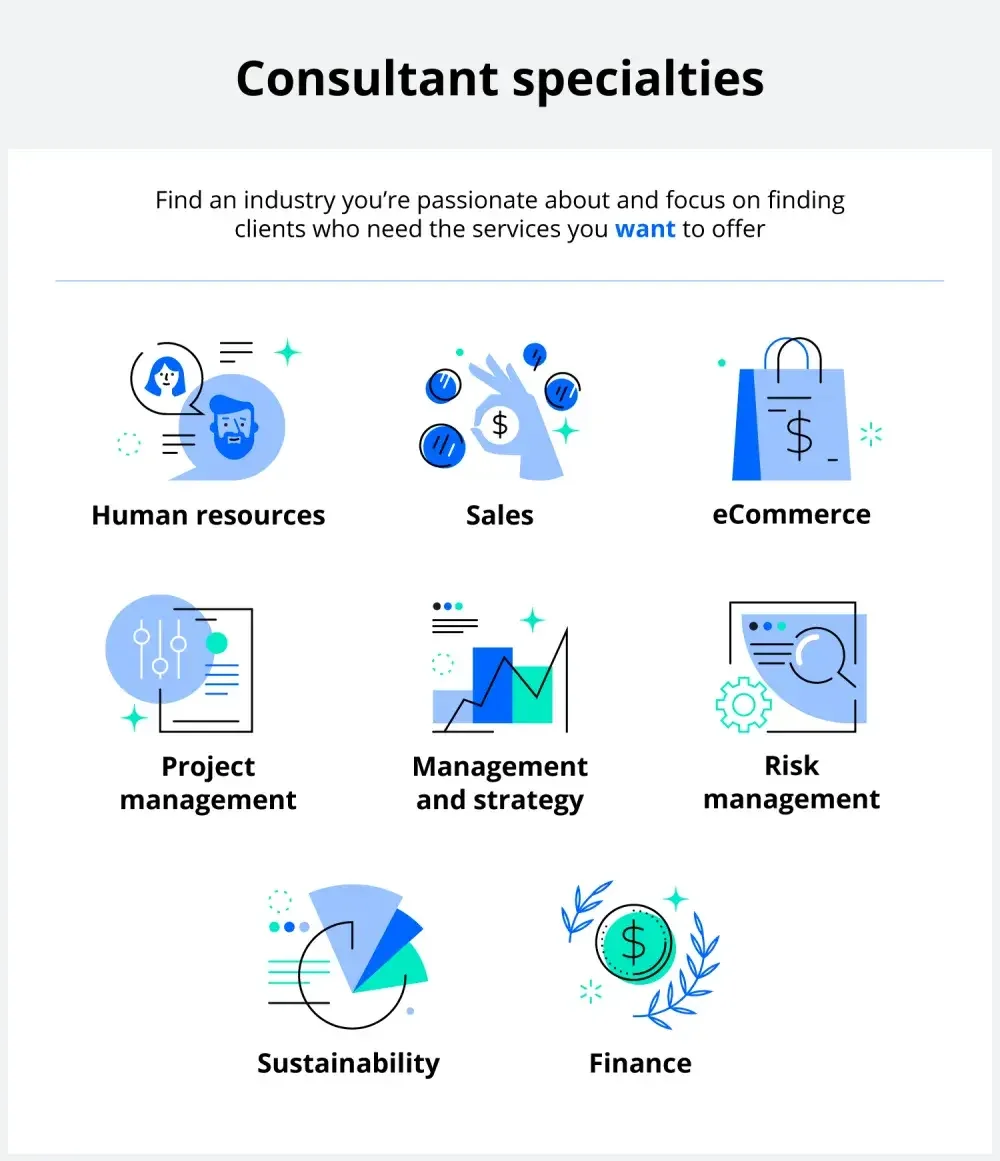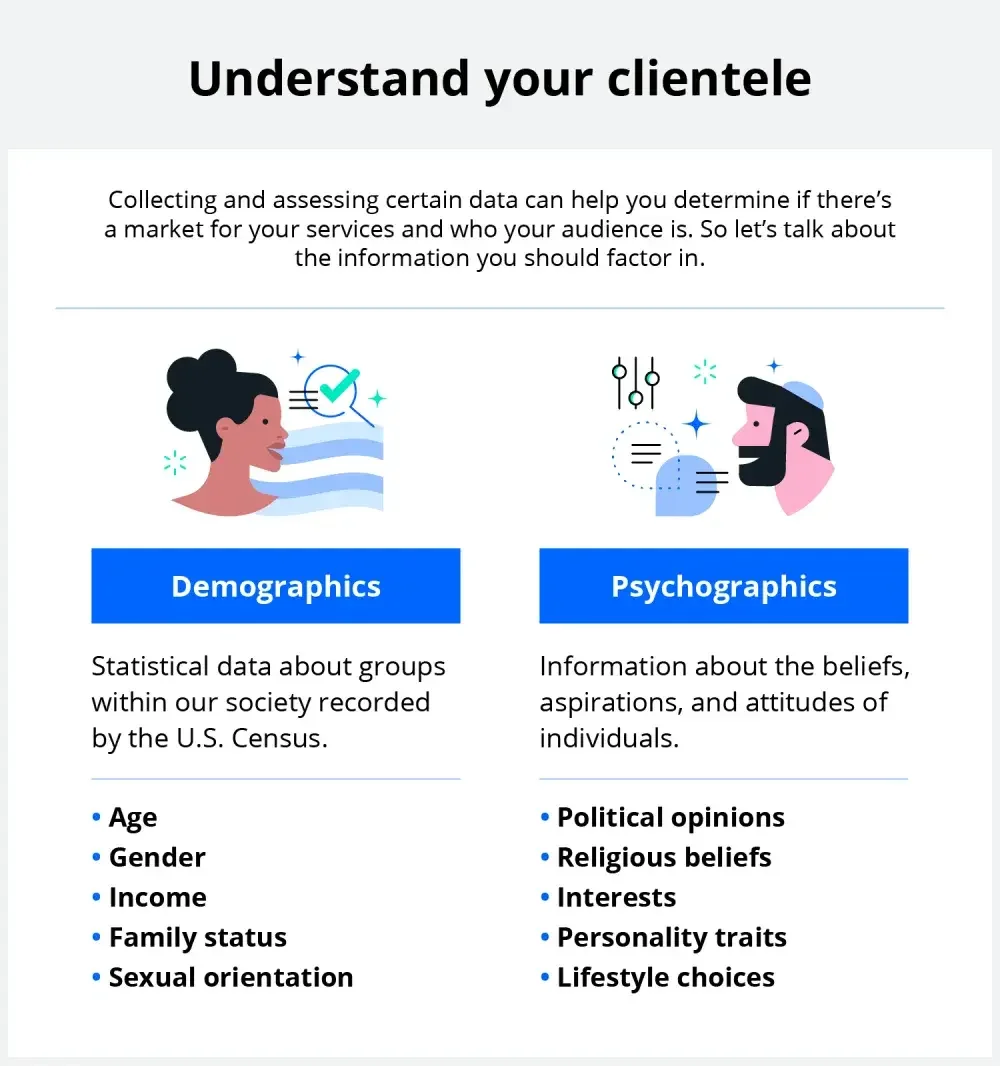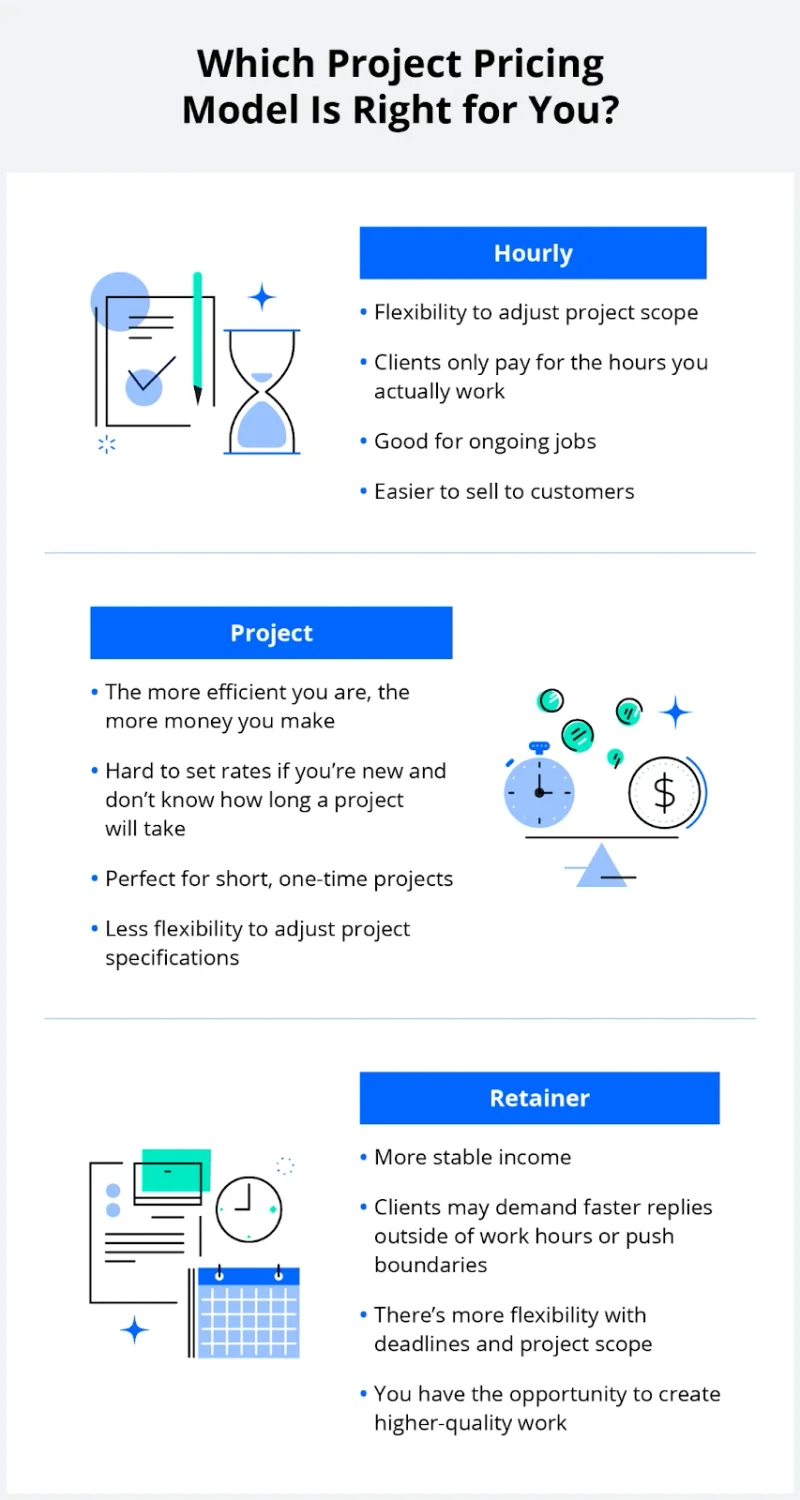With just a couple years of experience, you can start a fulfilling career teaching business owners how to operate more efficiently. Learn how to start a consulting business and take the companies you help to new heights.
In this guide, we'll tell you everything you need to know to decide if a consulting career is right for you. We'll also explain how to find a niche and what it takes to get up and running.

1. Decide if a consulting career is right for you
Becoming a consultant and starting a firm isn't for everyone, but if your personality and goals are a good fit, it could be an advantageous career decision.
The U.S. consulting market is worth $64.4 billion and spans many industries. Some of these markets include:
- Finance
- Real estate
- Education
- Tech
- Health care
Homing in on an area in which you excel can make you a better consultant, because it'll be easier to monitor industry trends and learn as much as possible about the topic, product, or service.
What are your career goals?
If you like the structure of a nine-to-five, prefer to receive guidance from company leaders, enjoy production more than selling ideas, or don't have much professional experience to lean on, consulting may not be suitable.
But if you can offer data-driven solutions and desire the flexibility to set your own schedule and be your own boss, becoming a consultant could be a smart choice.
Qualities of a good consultant
To become a successful consultant, you must know industry standards, understand the intricacies of the company you're helping, and foster trust with potential clients to win their accounts.
You can win over these prospects by displaying skills and strengths like:
- A customer-first mindset
- Problem-solving skills
- Analytical abilities
- Dependability
- Professionalism
- Communication skills
- Flexibility
2. Confirm that you're qualified to be a consultant
At a foundational level, the purpose of a consultant is to utilize research, data, and experience to help business owners and managers meet company goals. But to provide high-value guidance and industry insights, you must first obtain a degree, some professional experience, legally required licenses, and earn certifications to bolster your credibility.
Educational requirements
Consultants should have a bachelor's degree in a field related to the service they provide or the industry they intend to support.
Some clients may also consider additional CE courses and certifications to be an asset. A master's degree or an MBA is also an excellent asset.
Experience expectations
Generally, companies hire a consultant to fulfill jobs that a senior-level executive would typically complete. This helps them save money or take their time hiring to find a qualified candidate. Others, however, need a filler for general knowledge gaps or an overall staffing shortage.
So when you're starting a new consulting business, you generally have two options:
- Be a jack of all trades so you can help with any issue or task that arises.
- Offer a niche service within their industry that you are an expert in.
Both routes offer value to the company, and you can get started with as little as two to three years of experience.
Certifications, registrations, and licenses

Specific consulting certifications can boost your profile in the consulting industry. They can make you look more credible, give you an edge over competitors, and allow you to charge more for your services.
Enroll in courses for the following statuses to learn more about those subjects and pad your resume:
- Project management: Agile certified practitioner (ACP) certification, associate in project management (APM) certification, business value-oriented principles (BVOP) certification, certified associate in project management (CAPM) certification
- Sales: Certified inside sales professional (CISP), certified professional sales person (CPSP), certified sales leadership professional (CSLP), HubSpot inbound sales, RISE Up Sales, Salesforce certified administrator
- Human resources: Certified professional (IPMA-CP), senior professional in human resources (SPHR), programming in C#, project management professional (PMP), Society for Human Resource Management certified professional (SHRM)
- Management and strategy: Google Ads, Google Analytics, HubSpot content marketing, HubSpot inbound marketing, email marketing, Facebook Blueprint, AMA digital marketing
- Environmental and sustainability: International Society of Sustainability Professionals, the Association of Climate Change Officers, LEED Green Associate, Green Globes Professional, Living Future Accreditation
- Financial: Certified financial planner, certified public accountant, chartered financial consultant (ChFC), financial risk manager (FRM), chartered financial analyst (CFA)
These certifications will qualify you for consulting positions, but the degree you earn in college and your work experience will inform the industry you should specialize in.
3. Choose the consulting industry niche that's right for you
Companies hire consultants because they have particular knowledge the company does not.
For example, Karli Jaenike, founder of Juicebox Marketing, became an expert in search engine optimization. It took her years to master it, but now companies hire her for that deep knowledge. “You can become an expert by working in the field for some time and gaining experience working with companies of different sizes and niches," she says.
Lucrative consulting businesses niches
Generally, tech, finance, legal, and healthcare companies will pay the most for expert consulting support. But if you are knowledgeable about education or compliance, it should still be reasonably easy for you to find businesses in those industries that are willing to pay for your services.
Some of the top consultant niches you can pursue include:
- Strategy: This may refer to business operations or marketing. Regardless, strategy consultants will evaluate a company's goals, assets, competition, and more to generate a plan for properly allocating resources to complete high-ROI projects.
- Lead generation: Relating to sales, lead gen consultants are responsible for scaling companies by uncovering business and revenue opportunities.
- Financial advising: No business can stay afloat without keeping its financials in check. Finance consultants teach business owners and managers how to increase revenue and maximize profits while reducing risks.
- Business operations: Help companies streamline operations and save money by organizing client management, product delivery, and supply chain initiatives.
- Information technology: Provide staff and executives with the training they need to properly utilize software and equipment while assessing security risks and active threats.
4. Conduct market research

Once you figure out which industries you will work in, define your target market. You can determine who your market is by conducting research and thinking about who you want to work with.
Ask yourself these questions to see what's most important to you:
- Do I enjoy teaching individuals, small groups, or large organizations?
- Who is open to paying my prices and will celebrate my services?
- Do I prefer collaborating with small business owners, managers, or CEOs?
- Which behaviors do I appreciate and dislike in clientele? What demographics display those traits?
- Who shares similar interests and communication styles with me?
- What problems are these people having that I can resolve?
Jo Barnes, the founder of Your Lifestyle Business, says, “Include both demographics and psychographics in your definition."
How can I tell if there's a market for my consulting services?
Ultimately, if businesses have pain points and you can develop relevant solutions, there will likely be demand for your services. But you can also evaluate the market by determining:
- Who is interested in your services
- The kinds of issues businesses are experiencing
- How far away interested clients live and operate their business
- The number of competitors in your area
- How much people are willing to pay
Research your competitors
Consulting is a competitive field. Thousands of consultants may already be targeting the same clients you are. Before you start a consulting business, you must do your research, says business coach Janet Zaretsky.
“Are there a number of competitors in the space you intend to consult in? A lack of competitors indicates a lack of need," Zaretsky says. “Also, what are your competitors doing? You want to do as much research as possible on how to market offerings that sell as well as have a marketing consultant work on a marketing plan and messaging."
5. Create a business plan
Setting business goals, such as landing your first client within 30 days or sending 10 letters of introduction each week, can help you stay on track.
"Make sure, right from the start, you have set a vision for where you want to head and goals to help you get there," says Carlos Castelán, the founder and managing director of the Navio Group, a management consulting firm.
Creating plans for the present and future will benefit your consulting company in the long run.
“One failure I had initially was not setting goals for my business. I discounted the importance of doing so and, as a result, did not have a clear strategy or path for growth. Setting goals and tracking progress is important to building a business because it helps you make choices along the way that lead you to the desired successful outcome," Castelán says.
Once you understand your goals, write a business plan and include a(n):
- Executive summary: Tell the reader about your company, its mission, leadership information, plans for growth, and why it will be successful.
- Company description: Explain who, where, and how your company will serve.
- Market analysis: Share data about your competitors, industry trends, and areas of demand.
- Offerings: Outline all of the products and services you intend to offer and why people will choose you over your competitors.
- Target market: Define your ideal customer, why they're a good fit for your company, and how you can fulfill their needs.
- Strategy: Explain your ideas for promoting your business and garnering customers.
- Financing needs: Share how you plan to pay for overhead and recurring expenses. You should also document your intentions for fundraising, getting loans, or financing.
6. Register your business
Whether you plan to register your new consulting business as an LLC, sole proprietorship, partnership, or corporation, you'll need to register the business name, obtain a business permit, and register with tax and licensing agencies.
"If you are an individual, starting out as a sole proprietor will be fairly straightforward," Marah McMillan, a consultant to the apparel industry, says. "However, if you plan on setting up a team or you have personal assets that you want to protect, an LLC might be right for you."
7. Build a website and online presence
When companies need to hire a consultant, many will turn to an internet search.
Create a website that advertises your services and showcases your experience, background, and any certifications or designations you have. Be sure to use the keywords a potential client would use to find you. If you've provided similar services before—even if it was as an employee—ask for feedback and get permission to post testimonials.
"Add your business to as many social platforms as are appropriate for your industry, such as Google, Yelp, LinkedIn, Facebook, Instagram, YouTube, and Pinterest, as well as any other platforms that are applicable for your trade," McMillan says. "Remember that the more places that you show up on the internet with the same brand image and clear message, the better for SEO and customer attraction."
8. Obtain resources and assets
Once you complete your business plan, obtain all the assets you need to meet your goals. This may include things like:
- Equipment
- Staff
- Software
- Technology
You also need a separate bank account and service contracts for your services that spell out important information like deliverables, timelines, rates, and payment terms.
9. Choose a business model and set prices
As a consultant, the services you provide are impactful but also intangible. Deciding what to charge for your knowledge is a challenge.
"One common mistake when starting a consulting company is charging too much or too little," says Scott Cairns, founder and CEO of Creation Business Consultants.
Consumer demand, company expenses, goals, resources, and value proposition all play a role in selecting a business model and landing on a price for services.
"Study your industry's rates, so you know how much [to] charge as a starting rate," Cairns says.
How much do I need to charge to stay in business?
While consulting is a low-overhead business, you should have enough money in the bank to cover your costs until your cash flow increases, and you can create a firm budget.
"It's important to continuously monitor expenses in relation to current and projected revenue to ensure [you're] not making decisions that could jeopardize a business's solvency," Cairns says.
Part of your research will include looking at how competitors price their services. You will also need to calculate your upfront and recurring costs.
According to Michael Garbade, the founder of Education Ecosystem, you should “determine the strategies you will implement to deliver your services and how you will be charging the customers. This could be on an hourly basis or per-project rates."
Generally, new consulting firms should start with competitive pricing and raise prices as demand increases. Just remember to include your expenses in that amount, so you still make a profit.
Hourly pricing model
One option is to charge by the hour, which is a simple way of pricing and is often favored by startups. Set your hourly rate within the range of what others in your market are charging.
Determine your hourly rate
If you plan to work 40 billable hours a week and 52 weeks a year, divide your ideal annual salary by 2,080.
Hourly rate = desired salary ÷ 2,080
If you intend to work different hours, you will need to reflect that in the calculation. A standard template for that equation is:
Hourly rate = desired salary ÷ number of hours worked in a year
Hourly rate calculation example
If you want to make $200,000 per year, divide that number by 2,080 to get your hourly rate.
200,000 ÷ 2,080 = $96.15
This means you would need to charge clients just over $96 per hour to meet your income goals. That said, you need to make sure your pricing is competitive and you're not charging too much. Otherwise, potential clients may go elsewhere for help.
Pricing per project
You can also charge by the project, which helps clients understand their total cost. This is a good method of pricing if you're delivering a specific service, such as being hired as an IT consultant to set up a remote working network for a company's employees.
Like any pricing model, you will want to ensure your prices align with your competitors and that you're thinking ahead about how much work you need to complete to meet your income goals.
If you can determine how much you can charge per project on average and how much revenue you want to generate each year, you can determine how many projects you need to complete each month.
Retainer rates
A final pricing option is offering clients a retainer. This is a good structure if you provide ongoing support to a client. For example, a website design consultant may charge a retainer to manage a company's website, including any changes to content or running software updates.
The retainer essentially operates as a down payment for future services, so you will hold onto that money without spending it until they require your services. This is considered an unearned retainer fee. Once services are complete, the money will be regarded as earned.
You can choose to charge a monthly or annual retainer fee, or whatever schedule suits you. Just be sure to keep it consistent.
If you're new to the industry, you will likely charge for the work you complete. Once you're more experienced, you can also begin charging for access. This means that anytime a business reaches out to you with questions, you'll make money.
10. Market your business
To stay in business, you need to find clients.
While your website and social media platforms can help bolster your visibility and generate leads, one of the most effective things you can do is make real-life connections.
Some things you can do to prepare for your marketing journey:
- Memorize an elevator pitch
- Develop branding materials
- Start a marketing campaign
- Network with the community
- Join referral sites
Promote your business on social media
Don't be afraid to ask your current clients for referrals. Word-of-mouth advertising is golden. Also, participating in industry organizations and events can help you build your network. You may also find that large corporations or government agencies request consulting proposals online, and having a strong digital presence can increase your chances of getting the job.
According to Stephen Gagnon, the founder of CodeWeb, you can post high-quality content about your area of expertise on your social networks and your website. You can also create profiles on social media platforms LinkedIn, Facebook, Twitter, and Instagram. Promote your business with directories such as Google My Business and Yelp.
Barnes agrees, saying, “Pick a platform that suits your personality and works with how you'd like to deliver your content. Don't try to be everywhere at once. Master one platform at a time."
How to get more reviews and referrals
"Write down the [names of ] people who you have relationships with who can be helpful to your company and what role they will be able to play, such as mentor, client, or referral source," McMillan says. "Then start reaching out to your contacts and spreading the word about your new business."
Castelán believes that entrepreneurship can be very rewarding. "Don't be afraid to take a risk and pursue something you've always wanted to do," he says. "What separates consulting entrepreneurs from so many others is the ability to take risks and be comfortable making mistakes."
As more professionals decide to go out on their own, having a solid plan and a commitment to succeed can help you build your thriving consulting company. Being your own boss and helping others can be the best job of all.
"Consulting is all about reputation," McMillan says. "Trying to consult on a topic that you do not know well enough will lead to negative reviews and poor reputation. If you want to be a consultant but do not have an area of expertise, spend time gaining experience and insights. Look for ways to get right in the middle of what you want to be an expert about."
11. Generate more sales leads
Sales leads include any person or company interested in purchasing the goods or services you sell. It's a bonus if, after meeting, you determine that they fit the profile of your ideal customer and intend to buy. The best ways to find these prospective customers are to:
- Ask current customers for referrals
- Network at conferences and community events
- Utilize social media and online marketing
- Contribute to relevant forums
- Revisit old sales opportunities that didn't pan out
- Cold email prospects who meet your ideal customer profile
- Send out an email newsletter
Tips for a successful sales meeting
Once you've piqued the interest of a potential client, seal the deal with these tips:
- Set a meeting objective
- Create a meeting agenda and follow it closely
- Be personable but don't take over with personal anecdotes
- Stay on schedule
- Listen more than you speak
- Ask them if they have any questions, hesitations, or concerns
- Share ideas and solutions tailored to their testimony
- Plan next steps
How to create a winning sales proposal
If a potential customer is looking into their options and in discussions with several consulting companies, writing a great sales proposal might be just the thing to give you an edge. Follow these tips to write a winning sales proposal:
- Make a brief, reusable sales proposal template
- Tailor the proposal to address the prospect's pain points and reiterate the solutions you can offer
- Emphasize solutions, not just deliverables
- Offer them several service options
- List your most expensive solution first, then continue in descending order
- Use clear, concise, and relevant graphics like flowcharts and tables
What to include in a consulting service agreement?
Before the consultant commences work for the client, the two parties should sign a consulting service agreement to protect both sides in case of nonpayment, failure to deliver services, or problems that arise between the consultant and the client. The agreement also defines the duration of the consulting arrangement and the consultant's compensation.
- Date two or more parties entered into a contract
- Names and addresses of both companies
- Details about the agreed-upon services
- Duration of the contracted agreement
- Terms of termination
- Compensation details
- Noncompete clause
- Intellectual property rights
- Liabilities and exclusions due to unforeseen circumstances
- Signatures and titles from a representative of each company
Tips for nurturing relationships with new customers
Making sales is essential for any consulting business that hopes to scale, but few things are as important as maintaining the relationship of trust and respect that you've already established with new and existing clients.
These clients may continue to be a source of income for you, and if you genuinely make a difference for their company, they may even become your advocates and send more work to you. To continue building a positive working relationship with your clients:
- Deliver what you promised in the master service agreement
- Meet deadlines and communicate when delays arise
- Offer regular updates and encourage feedback
- Include clients in the process
- Personalize your interactions
- Build a reputation for essential values like honesty, integrity, and excellence
The reality of starting a consulting business
When you start any business, you can expect your lifestyle to change, work hours to vary, and to begin managing several elements of a business from analytics analysis and sales to advising and education. The good news is that over time, you'll find the right balance of boundaries and work that feels right to you. Then you can come out of it with a profitable business that shows how hard you worked.
Once you have a business plan and model in place and start to make sales, learn how to run your business and turn it into an undeniable success. Or, if you feel confident, download our consulting service agreement, so you and your clientele always know exactly what to expect.


